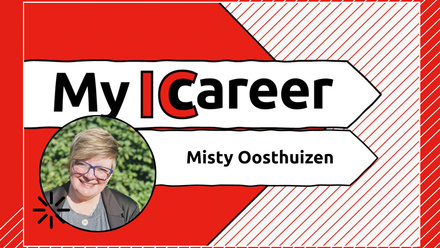The pandemic presented a crisis which required IC teams across the world to do our best work. IC has been central to crisis management, sharing business critical updates and helping leaders and employees connect with each other across thousands of home offices. As we navigate the ongoing uncertainty, what we do next to ensure IC remains a key function is critical.
Looking back to when I started my career almost 20 years ago, IC has undoubtedly evolved for the better. More than ever before leaders understand that IC is a strategic function that can help them to achieve their organisational goals. We now work side by side with leadership and core teams such as External Communications, HR and Technology. The fundamental principle remains the same – IC exists to enable people to connect and align with each other and the business to help create a high performing culture that everyone wants to be part of.
Like many people I fell into IC. I studied English literature and language at University and I began my career as a radio journalist. I then changed tack to work in the press office for a national charity. The team was doing incredible work, but the charity had no IC function. All the campaigns, the vision and change initiatives didn't mean much if the CEO couldn't reach his team and persuade them to join him on his mission. I suggested we set up an IC function and my boss agreed. I was put in charge to head it up and I never looked back.
I went on to work in the commercial and then public sector. I worked in global roles, where I got the opportunity to develop my skills and work with some brilliant people. I experienced a variety of different businesses and cultures close up. Some were a more natural fit for me than others, but it was all a good experience. Over the years I've learnt to be comfortable working with people at every level of the business, including senior leaders with very different styles and approaches.
This led me to my current role at the legal business Slater and Gordon. They were looking for someone to ensure their IC function could help the business through an important transformation. And now, 18 months on, after managing the Covid crisis communications, our focus is to adapt our framework to help people stay aligned and connected during ongoing remote working so that they can do their best work.
I'm also excited to be Programme Lead for the future 'Smart Working' model, which is about flexible and hybrid working, better use of office space (when the day comes), and great use of tech. As a working parent it's so rewarding to be involved in a programme which will see companies like S+G create more opportunities for parents and for better inclusion as a whole.
So here is some of my best advice:
1) Generalise to specialise
IC covers so many areas. This can be challenging but you can use this to your advantage. Learn as much as you can. Improve your business writing skills, manage channels, support leadership communication, get involved in change projects, do measurement surveys, run events and more. All of this experience will help you be a stronger IC pro later in your career when you will want to specialise.
2) Always listen, measure and adapt
Don't waste your time doing comms for comms sake. Focus on the outcomes of your work. Find out how employees experience your communications. Find measurement techniques to understand your impact and respond to what the data tells you.
3) Make sure your comms channels are aligned with your tech
Traditional cascade methods are important but more so are the advocates, networks and influencers making connections across the business. But to enable these networks you need good tech, and this is more important now than ever before. Stay up to date with all the latest digital comms trends, push for channel solutions that align with the overall business tech experience and ways of working. For this you need to have a great relationship with your technology team.
4) Enable people to communicate, don't do it all for them
IC is a strategic function there to facilitate great communication. There are times when it's right for you to build slides, write copy and post blogs for people. But know when it's more effective to facilitate others to do their own communication. Comms people need to do less and do it well, so work together with your colleagues to understand where you really add value.
5) Keep learning & developing
The world of work is changing fast and so is IC. IC pros need to be committed to continuous professional development so that you can keep doing a brilliant job. There are so many great resources, networks, podcasts, webinars and formal training courses out there. I'm always learning from them. So make sure you join in and continue to learn and develop within your profession and beyond it.
Get in touch if you want to know more or connect with me on LinkedIn. I'm happy to help and provide any further insights.






